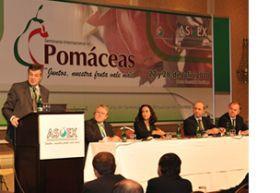
The Chilean fruit trade has inked an agreement with New Zealand certification company CarboNZero to reduce the level of carbon emitted in its production and export sectors, according to a report by SimFRUIT.
The deal was signed at the International Apple and Pear Seminar, organised by the Chilean Exporters Association (Asoex) and the University of Talca, in the presence of Chilean Agriculture Minister José Antonio Galilea, Asoex chairman Ronald Bown, and Antonio Walker, head of the Chilean Fruit Growers Federation (Fedefruta).
Reportedly the first certification scheme for greenhouse gases in the world to be accredited by ISO 14065, the alliance seeks to establish a programme to provide the necessary tools to help measure, monitor and mitigate carbon emissions.
To that end, Mr Bown said the agreement will contribute to the development of the Chilean fruit business, which he claimed is already (on average) at levels very close to those of New Zealand.
Minister Galilea explained that the agreement represented “a step towards meeting the requirements which consumers worldwide are demanding,” and would eventually allow Chile to “conquer new markets and stabilise those already conquered”.
The Secretary of State also stressed the importance of the agreement within the framework of Chile’s Food and Forestry Potential programme, which he said is increasingly helping Chile to become a world leader.
Within this context, Mr Bown stressed that competitiveness is “the big element that we have to strengthen over time”, since it would be the precondition for achieving “business sustainability”.
Minister Galilea agreed, adding that Chile needs “a more competitive agricultural sector” in order to raise production levels, improve quality of life for workers and also increase Chile’s share in international markets.
Indeed, the report said competition is set to be one of the linchpins of the new Chilean administration, which via the Ministry of Agriculture aims to promote various initiatives.
Those include: creating dialogue in the industry, a tax-free agriculture sector to monitor competition in the sector, a temporary status, signing new Free Trade Agreements and commiting to a policy that aims to avoid the currency exchange rate volatility.



